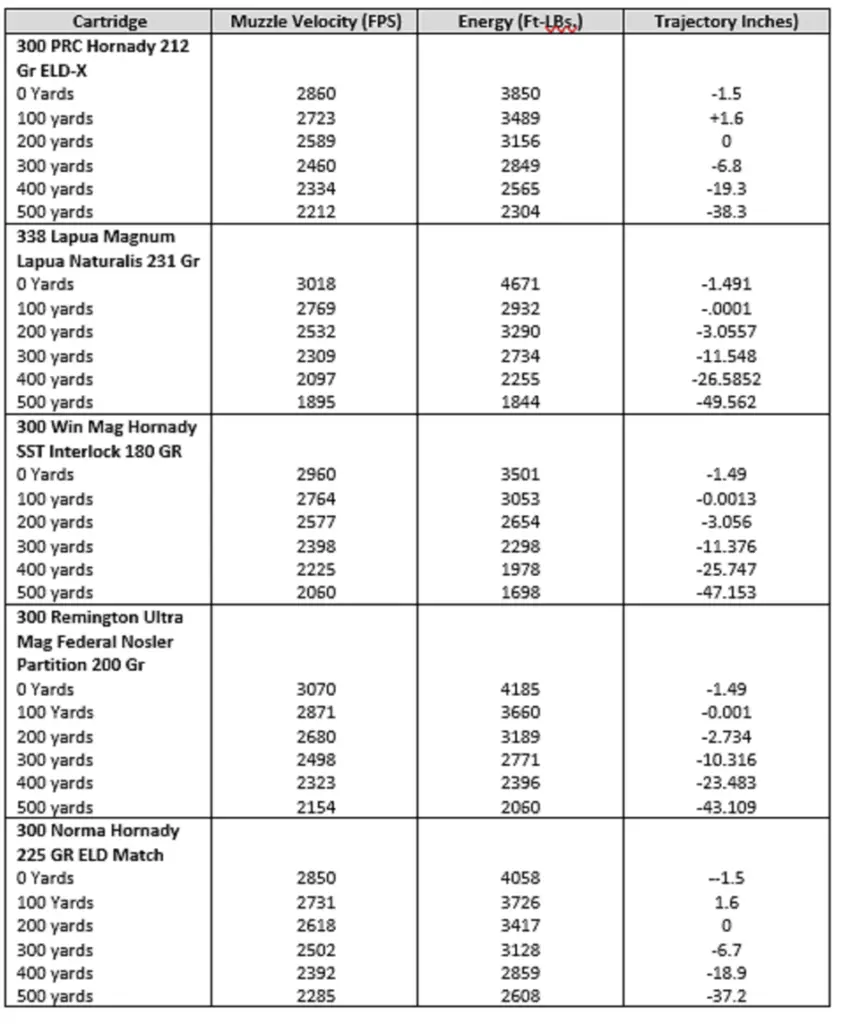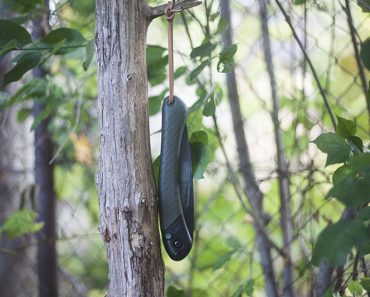The past few years have seen many new cartridge designs appear. Many of the new entrants into the ammunition market are designed for big game hunters or precision long-range shooters who demand a precision rifle cartridge.
First released in 2018 by the Hornady company, the 300 PRC (300 Precision Rifle Cartridge) carved out a niche with many shooters due to its performance.
The 300 PRC ammo is designed specifically to reap the advantages of today’s new, more efficient bullets.
300 PRC ammo is based on a .375 Ruger cartridge case that is necked down to accept the 30 caliber bullets. This cartridge case is non-belted and uses a standard bolt face design. The headspace for the cartridge in the rifle chamber is based on the 30-degree shoulder of the cartridge case.
Hornady understood the need for extra headspace to allow the 300 PRC ammo to use the newest bullets.
Consequently, the 300 PRC is a long cartridge case that won’t fit into a standard-length bolt action rifle. In addition to the extra length, the case diameter was designed with a .532-inch case head giving the 300 PRC more case capacity than many of its competitors while still fitting a standard magnum bolt face.
What Did a Longer Overall Length and Bigger Cartridge Case Mean?
For the Hornady designed 300 PRC, this meant also designing a rifle for the new cartridge design.
This is a classic example of form following function. Hornady designed a cartridge and bullet to get the performance characteristics first and then created a rifle chamber designed concurrently combining the necessary characteristics around that cartridge. The result is the 300 PRC, which was officially recognized by SAAMI in 2018.
30 Caliber Bullet Design
Let’s start with the bullets that the 300 PRC is designed to hold. Part of the answer here is the design of the rifle chamber as well as the overall length of the 300 PRC ammo. A longer overall length, dictated by a longer head space in the rifle chamber, allows the use of new bullet designs.
Specifically, the new longer 30 caliber bullets with a higher ballistic coefficient provide excellent performance characteristics from the 300 PRC. The effect of this better performance is seen in muzzle velocity, muzzle energy, long-range performance, and increased accuracy over some comparable cartridges.
Basic Ballistic Characteristics of the 300 PRC
From a ballistics standpoint, the 300 PRC seems to deliver outstanding performance, especially for long-range shooting.
If you are interested in long-range precision shooting for long-range hunting or competitive precision shooting, the 300 PRC offers some advantages. Looking at the basic ballistics of this cartridge is a good place to start understanding the 300 PRC cartridge.
These are the ballistics provided by Hornady for their 212-grain ELD-X bullet. This is one of the most common bullet weights found in factory-loaded ammunition. Of course, these numbers may vary depending on the powder choice of your load. However, factory-loaded ammunition should perform very close to these numbers.
It is easy to see that the 300 PRC can deliver extremely consistent velocity over a considerable distance. These speeds make for an excellent long-range performance that doesn’t have a large bullet drop over long distances. Much of this performance can be attributed to the new aerodynamic bullets.
The Comparisons that Tell the Tale
To get a better grasp of the advantages of the 300 Precision Rifle Cartridge, we need to do some comparisons of ballistics data and look at the other issues involved when shooting large and powerful magnum ammunition.
These affect the precision hunter, competitive shooters, and military personnel who may use these cartridges.
Choosing the Comparison Cartridges
I chose to use the 300 Win Mag, the 338 Lapua, the 300 Remington Ultra Mag, and the 300 Norma for my ballistic comparison. These represent currently available magnum cartridges used by the long-range shooting community and the military for long-range shooters
The comparison chart was compiled from factory ammunition published tables. The bullet weights are provided for reference. Where the information is available, I have noted the hunting rifle used to do the measurements to gauge the aerodynamic performance of these cartridges.
I chose to put the 300 Norma Magnum on my comparison chart because this is the cartridge that is currently being used by SOCOM personnel as their issue long-range shooting platform.
I think it is important that the 300 PRC be compared with the cartridge used by the professionals in this category.
300 PRC Versus 338 Lapua Magnum
The 338 Lapua is a favorite of long-range shooters for hunting and competitive target shooting. However, the 338 Lapua is not without its disadvantages. Perhaps the most notable downside to shooting a 338 Lapua magnum is the punishing recoil that this huge round imparts.
It must be remembered that the 338 Lapua was originally designed to defeat military-grade personal armor and 1,000 yards. This requires an extraordinary amount of delivered energy. The 338 Lapua certainly achieves this goal but at a cost to the shooter wielding the rifle.
Muzzle Velocity Comparison (Feet Per Second)
The 338 Lapua does develop slightly more muzzle velocity than the 300 PRC.
However, at 200 yards, the heavier 338 Lapua bullet is beginning to shed some of its speed advantages. BY 500 yards, the difference is considerable. At this stage, the 300 PRC definitely has an advantage at longer ranges.
Delivered Energy Comparison (Ft-LBS.)
The 338 Lapua does fair a bit better over distance on the amount of energy delivered on target. However, the 300 PRC still gains a slight advantage at 500 yards and beyond. The heavier bullet of the 338 Lapua retains energy better than the slightly lighter 212 grain 300 PRC round.
Bullet Drop Comparison (Inches)
The 300 PRC is a relatively flat shooting round for a bullet weight of 212 gr. You can see from this chart that the 338 Lapua Magnum begins to drop much quicker than the 300 PRC. Again, the 300 PRC has an advantage at greater shooting distances.
Felt Recoil (Ft-LBS)
The numbers here are relatively close, which indicated on paper that the felt recoil between these two cartridges should be similar. What the data doesn’t take into consideration is the difference between the rifles and the bullets.
Typically, the 338 Lapua Magnum fires a heavier bullet, and the rifles are heavier because of the chambering for the power of the ammunition. Moving more mass toward the shooter translates into more felt recoil.
What Does All This Mean for Hunters?
The 338 Lapua is considered by many to be a 1,000-yard rifle. However, very few hunters will ever venture out to this kind of distance.
In terms of performance, the 300 PRC delivers almost the same stopping power within the 500-yard range in a much flatter trajectory than the 338 Lapua. The biggest difference for many shooters is the reduced felt recoil produced by the 300 PRC ammo. For most hunters, the 300 PRC gets the nod from me in the hunting category.
The 300 PRC Versus the 300 Winchester Magnum
Among big game hunters, the 300 Winchester Magnum has a proven and dependable record for taking the largest and most dangerous of animals. This is a factor for many hunters who routinely hunt animals such as bears, moose, or other exotics.
The wide range of bullet weights and styles available for the 300 Win Mag give hunters, competitive shooters, and law enforcement agencies a wealth of choices depending on the application and the targets. The 300 Win Mag has proven to be a versatile and effective caliber.
Muzzle Velocity Comparison (FPS}
The lighter 180 Gr bullet loaded for the 300 Winchester Magnum delivers muzzle velocity near the 3000 FPS mark. However, this velocity falls off rapidly over distance. By the time the bullet reaches the 200-yard mark, the 300 PRC has retained more velocity. Because bullet velocity is a part of the effectiveness equation, the 300 PRC gets a checkmark in this category.
Delivered Energy Comparison (Ft-LBS)
In the delivered energy category, the 300 PRC wins hands down over the 300 Winchester Magnum. From the start at the muzzle, the 300 PRC delivers significantly more energy and retains that edge through the measured distance.
More delivered energy on target means a more efficient and effective cartridge when taking big game.
Bullet Drop Comparison (Inches)
The 300 Win Mag delivers almost identical trajectory performance as the 338 Lapua Magnum. When compared to the 300 PRC, the difference is significant. The 300 PRC cartridge shoots much flatter even though it is a heavier bullet. This can be an advantage to hunters who often take shots on big game at distances from 300 to 500-yards.
Felt Recoil (Ft-LBS)
The 300 Win Mag gets the top marks in felt recoil in this comparison. The larger powder loads in the 300 ORC, and the heavier bullet weight translates into higher felt recoil for most shooters. If recoil is a concern, this could be a deciding factor for some hunters.
What Does All This Mean for Hunters?
Taken together, the 300 Win Mag seems to be a great choice for hunters. The lighter recoil is a definite plus, but the trajectory and velocity may negate this recoil advantage, depending on your quarry.
However, on even the largest and most dangerous North American game animals, the 300 Win Mag is effective, and the lighter recoil may be a huge factor in a rifle caliber choice.
The 300 PRC Versus the 300 Remington Ultra Magnum
The 300 Remington Ultra Mag is not a caliber that is well known to most hunters. This cartridge is one of the largest that is commercially available to hunters. This is a beltless, rebated cartridge with one of the largest case capacities available on the civilian market.
The 300 Remington Ultra Magnum is a powerful cartridge capable of taking any big game species on the North American Continent. This cartridge has never gained a lot of acceptance because of possible overpressure situations and throat erosion problems in the rifle.
Muzzle Velocity Comparison (FPS)
Even I was surprised to see this comparison. The 300 RUM cartridge has more volume and is propelling a light bullet, yet at distance, the 300 PRC still shows a slight advantage in velocity.
Across the range of distances, the 300 PRC performs almost exactly like the 300 RUM but maintains velocity better as distance increases.
Delivered Energy Comparison (Ft-LBS)
Energy comparison of the 300 PRC and the 300 RUM show that initially, the 300 RUM cartridge delivers more energy by a little over 300 Ft-lbs at the muzzle.
However, very few bullets strike the target at the muzzle. If we look at 300 yards, which is a reasonable distance for some long-range hunting rifles, the 300 PRC has an edge in delivered energy.
Bullet Drop Comparison (Inches)
Out to about 300 yards, the 300 RUM is almost as flat a trajectory as the 300 PRC. However, things change rapidly past this point, and the 300 PRC gains a considerable advantage at 500 yards and beyond. Hunters appreciate the least amount of holdover correction necessary on long shots, and this gives the 300 PRC an advantage in this category of comparison.
Felt Recoil (Ft-LBS)
This comparison also came as a bit of a surprise. The felt recoil data for these two rifles is almost identical. The differences are small enough that without instruments to measure the readings, most hunters will feel the same sort of recoil from both rifles. I declare this comparison a draw.
What Does This Mean for Hunters?
Overall, I have to give the edge in this comparison to the 300 PRC. The first comparison categories show the 300 PRC outperforms the 300 RUM at the usual hunting distances. Felt recoil is almost identical, so there is no advantage either way.
The other factor that you must consider is weight and barrel life. The 300 RUM rifles are usually heavier and are known to have barrel erosion issues over time. Advantage 300 PRC.
The 300 PRC Versus 300 Norma
As I have said, the 300 Norma is the current caliber used by U.S. Military SOCOM forces.
The lineage of the 300 Norma can be traced back through the 338 Norma Mag and to the 338 Lapua Mag cartridges. The external ballistics of this cartridge is what got it the nod from the U.S. Military.
Several characteristics of the 300 Norma make it a viable option for big game hunters. First, it is a known and proven cartridge. Second, when loaded correctly, the 300 Norma will remain supers0nic passed 1500 meters (1640.42 yards or .93 miles). These are some impressive numbers.
Muzzle Velocity Comparison (FPS)
Of all the cartridges I have compared with the 300 PRC, the 300 Norma Mag is the only one that compares favorably in the velocity category. In fact, the numbers are strikingly similar, which makes this category a toss-up, in my opinion.
Delivered Energy Comparison (Ft-LBS)
In this instance, It is clear that the 300 Norma Mag is superior to the 300 PRC.
Over the entire distance, the 300 Norma Mag delivers more energy on target than the 300 PRC. Given that the velocities are almost identical, the better-delivered energy performance gives the 300 Norma Mag a definitive advantage.
Bullet Drop Comparison (Inches)
And we have another neck and neck result. If anything, based on this data, I would conclude that the 300 Norma Magnum, shooting a slightly heavier bullet, is a flatter shooting trajectory than the 300 PRC.
However, the advantage is slight and doesn’t indicate a clear winner.
Felt Recoil (Ft-LBS)
I will call this comparison another tie. The values are so close that most hunters would not be able to tell a noticeable difference in the felt recoil of these two calibers.
This comparison may be off just a tad due to the 180-grain lighter bullet being used for the testing. However, any differences would be hardly noticeable when shooting.
What Does This Mean for Hunters?
In my opinion, this comparison is a total toss-up. Both rifles are more than capable of taking any species of big game on the North American continent.
Both show relatively flat trajectories for such large bullets and maintain energy over long distances making both caliber bullets capable over long ranges. I have to declare this comparison a draw.
The 300 PRC and Hunting – A Good Choice
In this author’s humble opinion, anyone considering a long-range precision rifle cartridge won’t do much better than the 300 PRC rifle cartridge.
When loaded with a high ballistic coefficient bullet, the slightly larger powder capacity of this cartridge gives shooters a measurable advantage in kinetic energy downrange.
Other cartridges may fly faster or deliver more energy, but the overall performance of the 300 PRC gets this rifle cartridge my thumbs up for a hunting rifle taking big game in North America.





















































